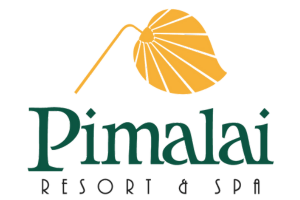Considerate and Responsibility
We CARE for our actions and we would like to be responsible to our actions as much as possible. Our management has signed our sustainability management plan and it is updated here.
Care for Social because Our People = Our Family
Our foundation in family goes back to early 90s, when a lawyer Khun Anurat Tiyaphorn discovered a small plot of land on Koh Lanta. Although Koh Lanta was merely accessible by car and had no electricity, Khun Anurat immediately felt in love with this piece of land and started dreaming of retiring in Koh Lanta, where he can spend most of his day on the beach and sailing. His belief in Chinese Feng Shui that says “a house leaning against the mountains and facing waters is auspicious and can bring good luck for people living in it” encourage him to begin his new journey.
In 1999, Krabi International Airport was opened and Khun Anurat saw an opportunity to share the beauty of Koh Lanta’s nature to international tourists and decided to build a 5 stars resort, where preserving surrounding environment and offering career development to local people were the key objectives.
WE care FOR PEOPLE SO THEY CAN BE THEIR best
We always put our people on the top of list of people we should take care of. Pimalai was built as a family but it is also a workplace where we care of our guests every day. Genuine care is at the heart of our business that makes Pimalai unique.
Our 24/7 operation is intensive and it is important that we take good care of our people’s mind, body and spirit. Caring for our people’s minds means providing tools for them to stay engaged and focused on providing best services, and supporting continual learning. Caring for our people’s bodies means supporting their energy and health, including exercise options, spaces to relax, and free healthy snacks and meals in canteen. And caring for our people’s spirit means allowing them to nurture relationships and connect with their communities through networking opportunities and volunteerism.
Pimalai offers on the job training programme for students who are looking for first-hand experience in hotelier. Three to six months internship programme were offered to students in more than 10 colleges and universities around Thailand. At the end of the internship, each student will be carefully evaluated by their head of department, and they will receive first priority for job application when applying for job at Pimalai. More than 10 interns have joined Pimalai family over the past years.
OUR COMMUNITY
The Little Scientist House
Little Scientist House is Princess Sirinthorn’s project to encourage Thai students to study more sciences through science experiments since there was a research confirmed that cultivating positive attitude in scientific learning skills and scientific process to children since primary level (age 3-6 years old) will help to increase learning capability and recognizing.
Pimalai Resort and Spa became local network leader since 2014 and invited 11 schools on Koh Lanta to join Little Scientist House programme.
All 11 schools will have to pass Her Royal’s Assessment that includes completing at least 20 scientific activities and 1 scientific project per year in order to receive Her Royal Trophy.
In 2022, Wat Koh Lanta School passed HRH’s Assessment and is also qualified to become The Local Trainer.
In 2023, Pimalai assisted 8 more schools to receive Her Royal Trophy. We will sponsor 8 teachers from the following schools to Her Royal Trophy Ceremony on 22 July 2023:
1) Bann Tung Yee Peng School
2) Baan Jay Lee School
3) Baan Sanggaou School
4) Baan Tung Vittayapat School
5) Baan Lang Sord School
6) Baan Loh Yai School
7) Baan Klongnin School
8) Baan Phra Ae School
We are thrilled to extend our warmest congratulations to all schools for their outstanding achievement in winning the prestigious Royal Trophy.
Due to the lack of teachers, two schools were not able to complete HRH’s Assessment. Since their major obstacle has been identified, Pimalai will assist them with the assessments and project work so that they will be able to receive Her Royal Trophy in 2024.
Moving forward, Pimalai has extended training scientific activities to primary school students. In 2023, 3 schools have joined us in extending the activities to their primary school students.
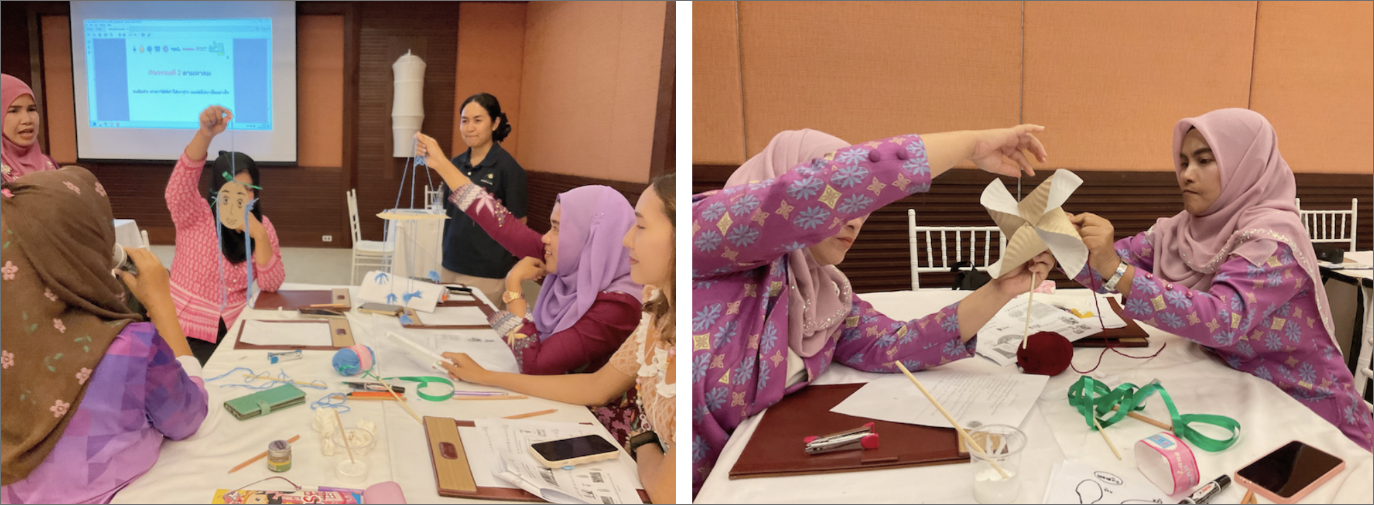
Waste Management Programme
Once a month, Pimalai invites children from local schools to join our weekly garbage pickup. We use this event to strengthening our bond between our resort and our local communities. Children start to learn habit of cleaning up our beloved island. Pimalai also gave separate trash bins to local schools so that children will learn to separate trash and make extra money from selling reusable trashes. In 2019, Pimalai and Koh Lanta Authority hold a contest for local schools to participate in creating sealife sculptures from trash they collected. The sculptures were shown at Laanta Lanta Festival and the wining school received some cash award.
Say No To Plastic Bag
Pimalai offers Say No To Plastic Bag bag for sales with no profits. All proceeds less cost will go to local school to support their waste management programme.
Care for Environment
Because Khun Anurat has always treated Pimalai as his home, he made sure that architect and interior design and construction plan value and respect the existing environment.
- Our architect and construction team worked hand in hand to mark down and keep as many existing trees as possible during the construction. We use hundreds of years old Banyan Tree as a centerpiece at our hillside main facility area.
- The design does not compete with existing environment. Design layout and colour scheme that blend in with the nature – so that guests can fully relax in the flourished nature.
- Koh Lanta climate and water supply were carefully studied before we began our construction. We built waterway to collect natural water from the mountains and built water reservoirs to store rain water, knowing that the island can experience shortages of water during summer. Water from our reservoirs are filtered and fed to each room and outlets. Waste water is fully treated and used for watering our plants, we discharge zero waste water.
We crafted our operation processes to provide our guests with 5 stars services and hygienic level, while we continue working on new innovations to reduce our impact to the environment as much as possible.
The healthy forest that we have around us, and the greens inside the resort is our proof of our commitment towards healthy environment:
- Variety of plants: more than 30 variety of plants can be found on property including Banyan Tree, Leelawadee, Coconut Tree, Pandanus Tectorius, Cashew Nut, West Indian Jasmine, Broadleaf Lady Palm, Monstera, Bird of Paradise flower, Palm trees, etc.
- Varity of wildlife: including lemurs, monkeys, monitor lizards, colugos, Green-backed flycatchers, eagles, hornbill, puff-throated babbler, dolphins, killer whales, etc.
Zero waste
In additional to reuse, reduce and recycle strategies that we implemented, we have set up a team (consists of HK, Engineer, Gardener, HR) to check garbage that cannot be recycled and come up with strategies on how to reduce garbage.
We separate all trashes from its source and continue to monitor the amount of wastes that we send to landfill, and always encourage our team to come up with new ideas on how to reduce wastes that go into landfill.
1) Food wastes go to fertilizer making facility.
2) Recyclable materials (such as plastic, glass, can, paper) are sold for recycling.
3) Others go to landfill.
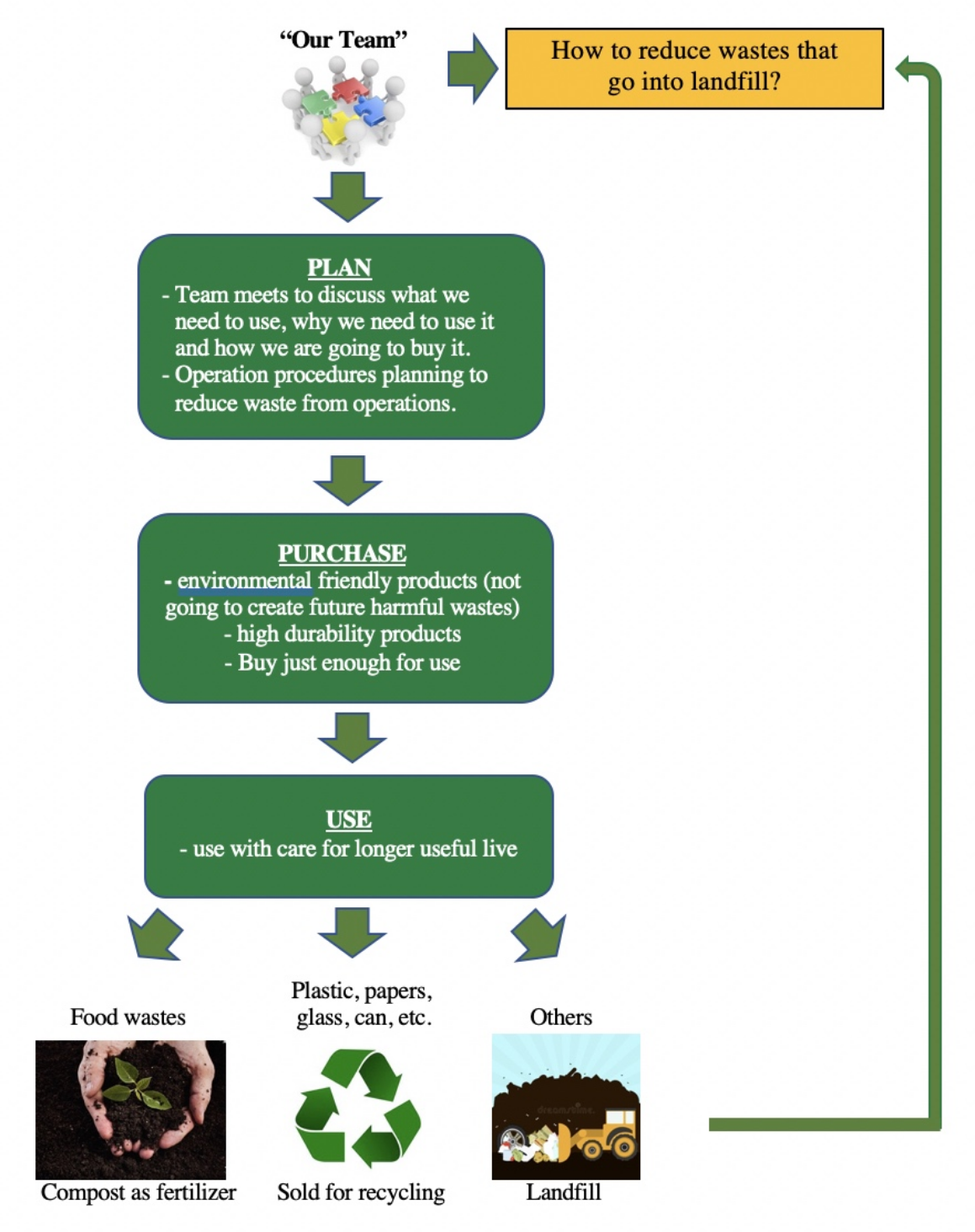
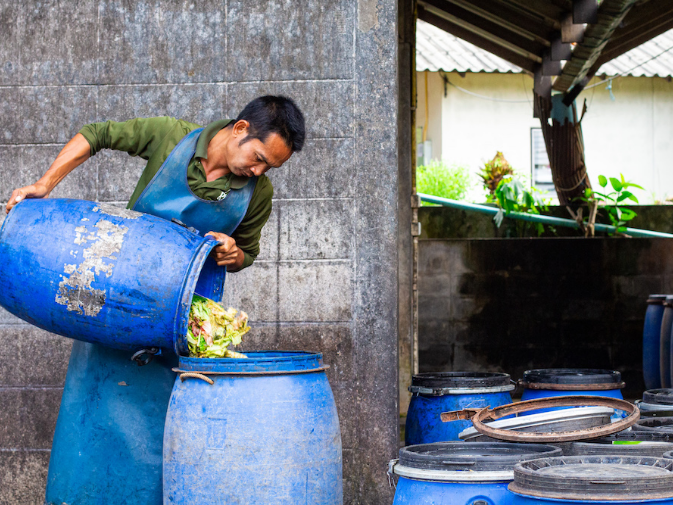
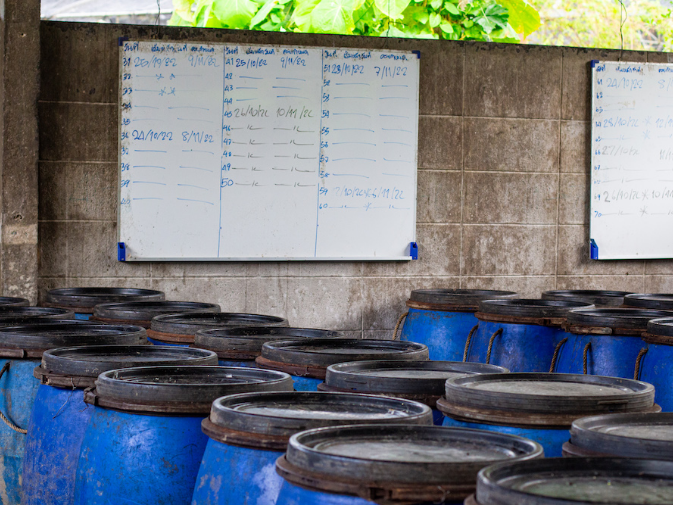
REDUCE
Zero Food Wastes
Reducing food wastes can be achieved through detailed planning for menu items, food presentation, materials sourcing and food storage.
Design menu and food presentation:
- Raw materials that can be used for variety of dishes.
- Everything on the plate or in the glass is eatable (no more umbrella or uneatable flowers on cocktail glass), even garnishing items on the plate must be eatable.
- Design a menu that can use ugly food i.e. vegetable soups, smoothies.
- Carefully plan how to rotate raw materials. For example, slightly bruised mangos that cannot be served as “mango and sticky rice” but they can be served as daily fresh mango smoothie during breakfast.
- Design the right portion of food so that food will not be wasted. Complimentary beverages, snacks, bread and butter are served at the right portion and refill if needed.
- Promote “Eat Everything” concept.
- Plan purchase:
- Carefully check daily occupancy and business forecast before ordering raw materials, and order just enough because less storage means less wastes.
- Sourcing from local producers as much as possible in order to reduce carbon footprint during transportation. However, all suppliers need to meet our quality and hygiene standards.
- Storage:
- Reduce single use plastic by using plastic containers with lids for storage instead of plastic wraps or aluminum foils whenever possible.
- Unfortunately, proper storage using vacuum plastic bag helps reducing food wastes during storage. As a result, we still need to use small amount of vacuum plastic bag for storage.
- We periodically review the use of vacuum bag usage and set target to reduce vacuum bag and single use plastic wraps. Any leftover food that cannot be stored are sent to canteen on a daily basis.
Target: To support/ coach/ guide Koh Lanta Community to successfully create zero food waste programme.
Reduce other wastes
Stop the single use and start “REUSE” by:
- Raising awareness among Pimalai’s team through weekly beach cleanup and discussion groups regarding why we need to reduce using single use items, and how we can achieve our objective together.
- If purchase team receives purchase requisition for non-durable goods or single use items, they will have to recheck with head of department for valid reasons for buying such items.
- Sustainable team review all items in storage that are considered as single use items on a regular basis, such as paper cups, room service paper trays, plastic food boxes and cutlery for take away services, bamboo chopsticks, paper coasters, vanity kits, toothbrush kits, etc., and come up with plans to replace these single use items.
- Plastic bottled waters removed.
- Digitalize business processes such as reservation, check-in/ check-out, room service ordering, handling guest requests, accounting and administrative processes in order to reduce the use of paper, and ink. This digital transformation is expected to save 30 trees per year, and reduce toxin in landfill from dumping ink cartridges and toners.
- Use digital signages and mobile application for communication instead of printing leaflets and flyers.
- Digital keycard made from non plastic is in place, digital coupons and digital signages instead of print is the next step.
- Annual review of expenses related to printing costs, and come up with plans to replace them with appropriate digital forms.
- Single use items in accommodation such as toothbrush kit, sewing kit, shaving kit, nail file have been removed as we want to encourage our guests to travel with these essential personal items. For those who may have forgotten packing one of those, we can of course assist on site on request.
Target: Reduce the use of single use items by 90% by 2027
Composting Statistics



Target: Reduce % trash sent to landfill by 2% each year.
Reduce carbon dioxide emissions
We have carefully planned the use of our transportation to limit carbon dioxide emissions as much as possible. We will start using Green View Portal to track and report carbon emissions, energy consumption, waste diversion, food waste, community donations, volunteer hours and our investments in efficiency projects. Green View tracking system is recognized by the Global Sustainable Tourism Council (GSTC) and we hope to be able to show substantial improvement in reduce our carbon dioxide emissions.
Target: Start offsetting carbon in 2025.
Sustainability
Pimalai Resort Shop
We support Koh Lanta’s produces, local produces and eco-friendly products, such as recycle bags made from rice sacks and recycled swimwear made from plastic, and also environmentally friendly product such as reef safe sunscreen. We have decided to stop providing single use guest amenities such as toothbrush, toothpaste, nail file, razor and provide reasonable quality amenities for sales at resort shop.
Clownfish release and coral propagation
The film “Finding Nemo” hit the Box Office in 2003 and told a story of a father clownfish searching for his son “Nemo”, who was captured from the ocean. The huge success of the film resulted in some unintended consequences to the ocean.
Koh Haa was a natural habitat for clownfish until 2004, when we found that all clownfish disappeared, and many pet markets started to sell clownfish at 10 Baht per fish. Khun Anurat and Dr. Thon (marine biologist) came up with the idea to try to raise the awareness of the importance of marine ecosystem, and demonstrate how difficult it is to return something back to the nature once it has been destroyed. To ensure the success of this project, Dr. Thon assigned Khun Kullawit Limchularat (one of his master degree students in marine biology) to study how to successfully release clownfish back into the wild and use this project as his graduating thesis.
Khun Kullawit dedicated many years on this project before he graduated in 2008. By 2010 we started to see that our released clownfish reproduced which reconfirmed the success of this project. If you have a chance to visit Koh Haa, look out for our released clownfish in sea anemones.
Keystone of sustainability projects
- December 2004 : Our first clownfish release, our first catastrophe : all 10,000 clownfish were eaten in less than an hour. Lesson learned: farmed clownfish do not know that sea anemones will protect them from big fish. After a couple of releases, Khun Kullawit came up with the idea of putting a cage over sea anemones and release clownfish inside the cage to protect them.
- 2008 : The completion of “The Study of Suitable Method to Introduce The Anemonefishes Back into Natural Habitat”.
- March 2009 : Khun Kullawit demonstrated how to release clownfish based on his study to volunteer divers.
- April 2012 : Release clownfish and seahorses
- December 2016: Starting our coral propagation project (https://www.youtube.com/watch?v=mc3otXpJ-y0&t=22s)
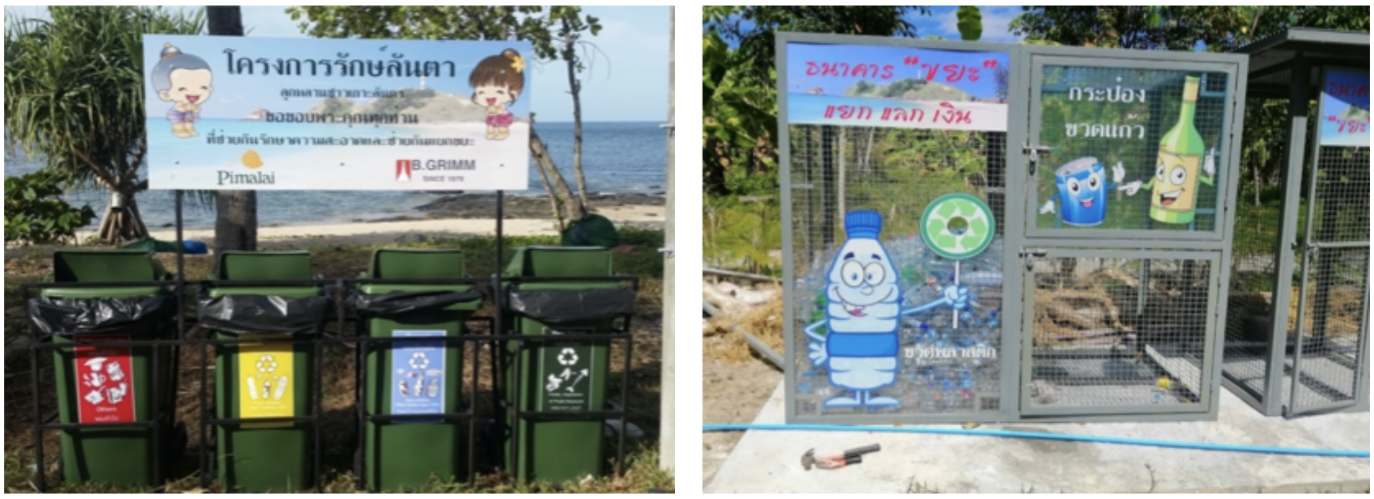
In March 2020 and March 2023, our students were able to set up sales booths at annual Lanta Laata Festival to sell products they made from trash. Their sea life sculptures made from trash were used to decorate the festival and the winning schools received awards from the President of Krabi Provincial Administrative Office.
Turtle, crab and hermit crab release
On 17 October 2022, fifty sea turtles were set free at Kantiang Bay, the 900-metre-long stretch of sand lapped by the crystal clear waters of the Andaman Sea. As sea turtles only return to safe and clean beaches to lay their eggs, the decision of use Pimalai’s shoreline is a vote of confidence in the resort.
Pimalai also helped to release 2,000 land hermit crabs into the wild. They are also natural beach cleaners and help to accelerate the decomposition process, which makes them wonderful housekeepers for Kantiang Bay! 10 million flower crabs were also released. Also known as blue swimmer crabs, this species is a popular delicacy in Thailand and many native fishing communities make a living from catching and selling them at markets. By replenishing the stock of crabs, we are helping to support village economies while also ensuring the sustainable survival of the species for generations to come.
Support Local Businesses
Pimalai Resort and Spa also works hand-in-hand with islanders and supports local businesses such as encouraging our guests to visit:
- Combining Pimalai’s signature Talabeng Scenie Cruise with a visit to Old Town Lanta so our guests can visit Lanta Community Museum to learn ways of traditional living on Lanta island, buy souvinirs and have local food.
- Extensively promote mangrove forest tour on gondola boat, a tour which is organised by Tung Yee Peng Villagers. All proceeds from pre-purchase go to the villagers without any deduction.
- Support Following Giants – The elephant sanctuary on the island. This project is also supported by World Animal Protection to return elephants back into the wild.
- Support Aunty Bee’s Eco Handicraft, which sells bags made from recycled products.
- Assist Koh Lanta’s Sheriff and Koh Lanta Travel Association to create a day tour package to fishing and squiding on Koh Por, which is a small island near Koh Lanta, where only 80 families live on it.
Rak Lanta Project
Over the past decade, Koh Lanta has seen a substantial increase in the number of tourist arrivals on the island. One outcome of this growth is that waste management is now becoming a major issue due to the lack of a suitable landfill facility. Local authorities also face challenges in managing the problem with limited resources.
Pimalai Resort and Spa participated in Rak Lanta Project to raise awareness with in the community to protect Koh Lanta’s exquisite natural environs and to reduce waste pollution both on land and at sea.
To raise our students’ awareness to understand the importance of reduce waste and waste management to conserve our environment, Pimalai Resort and Spa cooperated with B. Grimm to provide waste bins and garbage storage facilities (called Waste Bank) around the island (in public areas and schools) to separate wastes for recycle purposes. Recyclers can buy cans and bottles from Waste Bank and generate extra incomes for local schools. Support each school to create campaigns how to management wastes and protect our natural environments, and spread their campaigns to parents and other people living in their community.




We continue to join our community and local students to pick up garbage from public beaches and roads at least once per week.
Moving towards circular economy
Our attempts to stop using single use items and reduce wastes that go into landfill moved us one step closer to circular economy. Our practices are shared to people in our community and we hope we can be a part to drive our community towards circular economy. Here are the small samples that we have implemented in order to achieve circular economy:
- Developed energy and water conservation plans with specific tactics for operating optimally, including lighting schedules and water leak reporting and responding procedures.
- Sharing car – free staff shuttle to town is combined with our bi-weekly purchase pickup, and scheduled shuttle car for transporting staff from hotel ground to staff canteen.
- Electrical buggies for transporting inside resort’s premises, and when electronic vehicles are widely available in Thailand, all vehicles will be replaced by EV.
- Local and organically sourcing. Flowers for hotel decoration from our own farm next door. Organic fruits and vegetables come from our on-site organic nursery or from our farm in Chiang Mai. Encourage use of local services such as National Park tour, mangrove tour or tour into local community for cultural learnings.
- Growing on-site organic vegetables and herbs so that pesticides and chemical fertilizers will not be used, and less transports from Chiang Mai is needed.
- Trash tracking since 2012 – we keep record on how much food scraps go to fertilizer making facility and always encourage our team to suggest ways to reduce this number.
- Reducing trash. Soap bars have been replaced by liquid soap in ceramic bottles, where we can refill the bottles. Digitalize working procedures to reduce papers and ink.
- Tool kit for managing food waster – regular training and update procedures to optimize it.
- Separate all trashes and sell papers and plastics for recycle. Wet trash will go to fertilizer making facility.
- Building a culture to care for environment: Through frequent discussion and trainings, our departmental managers are always reminded of the importance of simple steps such as turning off faucets while cleaning, pre-heating kitchen ovens only as needed, and reusing fertilizer bags to collect garbage in resort premises. Our team is constantly reminded to think about consequences of their actions towards our environment. A garbage pickup on different locations on Koh Lanta is Pimalai’s weekly activity to strengthen our bond and involve in cleaning our beloved island. Once a month, Pimalai will invite children from local schools to join our garbage pickup and our chef will prepare some snacks to thank these children.
